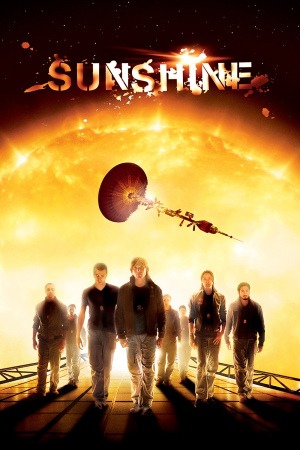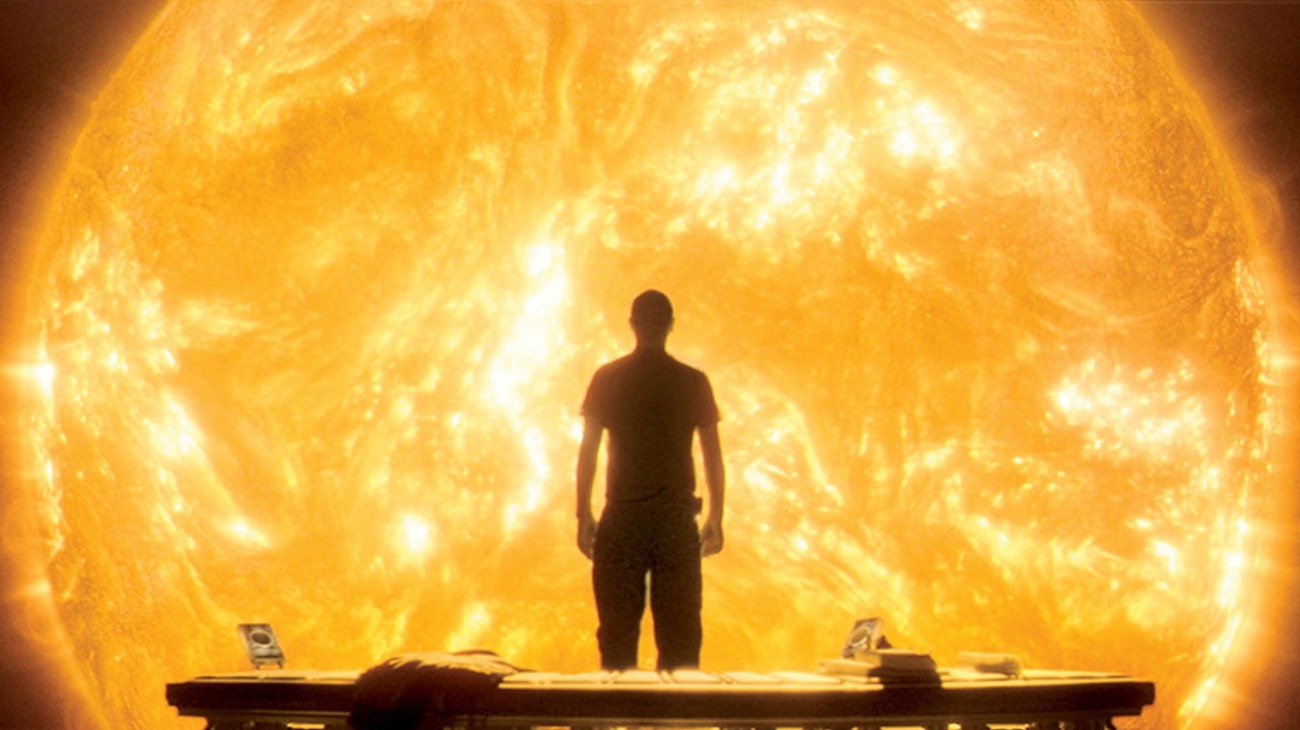
Set the controls for the heart of the sun
Science fiction in the movies has always had a rough time of it, compared to literature. Not that there aren't plenty of sci-fi films, of course; but they tend to be much more of the "ray guns and space battles" variety, and not the "speculative musing on the way that our race will function in the future" variety.
Which makes sense, because so-called "hard" sci-fi isn't really so dramatic as ray guns and space battles, and movies that aim for that noble 1950s ideal of trying to explore the "science" half of "science fiction" end up looking rather often like the noble block of wood Destination Moon. But there are exceptions to any rule, and by far the most famous and well-loved hard sci-fi in cinema history is Stanley Kubrick and Arthur C. Clarke's 2001: A Space Odyssey, which combines a rigorously prosaic exploration of the quotidian technology of a past future with some of the most gonzo neo-spiritual philosophy ever committed to film. There aren't many films like it, and the few that come within swiping distance are all either incoherent or unwatchably dull.
Well, now we've got a film that comes very close to 2001 indeed, and rather than being incoherent or dull, it's very nearly a masterpiece: Danny Boyle's Sunshine, one of the most inventive and fascinating science-fiction films in decades.
I'm not going to pretend that I'm not strongly biased in favor of this kind of movie; I cut my teeth on this sort of thing at a very young age, and most of the criticisms that could be most successfully leveled at this film - the characters are flat, the story is almost non-existent - I would meet with a shrug and the rejoinder "So what? That's the point." I mention this only to admit that my response to Sunshine is, while probably not unique, certainly idiosyncratic.
So with all that out of the way, what is Sunshine, anyway? Well, are you familiar with The Core? That's basically it, except instead of going in, they're going out. The sun, you see, is burning out, and rather than let all life perish, a team of astronauts and physicists have been sent aboard the unsubtly-named Icarus II with the sum total of the earth's fissile materials to set off the a nuclear explosion within the star, hopefully restarting its processes.
Unlike The Core, however, none of this is melodramatic bullcrap. Well, the end kind of is, but I'll get to that later. Instead, Sunshine is mostly just a fly-on-the-wall study of people working under increasingly difficult conditions, mixed in with perhaps beautiful, perhaps deranged musings on the face of God and what it means for human to look upon it. But even more than those things, it's a story of people who are very tiny in a very big universe.
The difference between "meditative" and "boring as fuck" is largely one of personal taste, but that won't keep me from saying that Sunshine is above all a meditative film: the images that linger strongest in the mind (and this is an oppressively visual film) are mostly poetic abstractions: I am here thinking of an extremely close shot of a man's eye as intense sunlight filters through his sunglasses, or an extremely wide shot of a frozen corpse drifting beyond the corona of the Icarus's solar shield and evaporating in a quick burst of flame.
Between them, these two images encapsulate pretty much the entire experience of the film: one the one hand, it is about quasi-religious ecstasy, as expressed by the mystical language certain crew members use to describe the feeling of light (in the film, the sun and God are directly linked, although it's not completely easy to say which is a metaphor for the other); on the other hand, it is an unblinking, passionless document of man's experience in space. I'd be all coy, like, "so what does that remind us of?" except that I already name-dropped it, so let me just reiterate: 2001.
Like that film, I think it's best to avoid getting caught up in the queerer elements of Sunshine's plot, and just settle in for the hypnotic pace of watching and listening. The film is surely not rooted in any sound stellar physics, but if one can get around that fact, this is a brilliantly plausible representation of humanity's future, as embodied by eight essentially anonymous souls. The eight actors brought in to play those characters are all recognizable without really being superstars, and some of them are perhaps over-qualified (Cillian Murphy, Michelle Yeoh), whereas some of them are suddenly revealed to be pretty decent actors, after all (Chris Evans). But the characters are perhaps not so important once their basic inalienable humanity has been established. Besides a general delight at seeing Murphy in yet another film, I didn't walk out of the film thinking of the lovingly nuanced human psychology on display.
Now then: the ending. Even a dedicated post-narrative mindset bent upon a story-light film can only take you so far, and the point at which Sunshine rather abruptly turns into Alien is... unexpected (although like Sunshine, Alien is a slow-moving exposé of speculative science before it becomes a horror film). Now, we're only talking about twenty minutes or so. But it's a curious bit of weirdness anyway. Happily, it's resolved before the movie ends, and so the final moments are not a patch of annoying atonal thrills, but a quiet, meditative look at et cetera. It's a potent reminder in the middle of a particularly dreary summer of cinema's rare power to simply, powerfully, mesmerise us.
Which makes sense, because so-called "hard" sci-fi isn't really so dramatic as ray guns and space battles, and movies that aim for that noble 1950s ideal of trying to explore the "science" half of "science fiction" end up looking rather often like the noble block of wood Destination Moon. But there are exceptions to any rule, and by far the most famous and well-loved hard sci-fi in cinema history is Stanley Kubrick and Arthur C. Clarke's 2001: A Space Odyssey, which combines a rigorously prosaic exploration of the quotidian technology of a past future with some of the most gonzo neo-spiritual philosophy ever committed to film. There aren't many films like it, and the few that come within swiping distance are all either incoherent or unwatchably dull.
Well, now we've got a film that comes very close to 2001 indeed, and rather than being incoherent or dull, it's very nearly a masterpiece: Danny Boyle's Sunshine, one of the most inventive and fascinating science-fiction films in decades.
I'm not going to pretend that I'm not strongly biased in favor of this kind of movie; I cut my teeth on this sort of thing at a very young age, and most of the criticisms that could be most successfully leveled at this film - the characters are flat, the story is almost non-existent - I would meet with a shrug and the rejoinder "So what? That's the point." I mention this only to admit that my response to Sunshine is, while probably not unique, certainly idiosyncratic.
So with all that out of the way, what is Sunshine, anyway? Well, are you familiar with The Core? That's basically it, except instead of going in, they're going out. The sun, you see, is burning out, and rather than let all life perish, a team of astronauts and physicists have been sent aboard the unsubtly-named Icarus II with the sum total of the earth's fissile materials to set off the a nuclear explosion within the star, hopefully restarting its processes.
Unlike The Core, however, none of this is melodramatic bullcrap. Well, the end kind of is, but I'll get to that later. Instead, Sunshine is mostly just a fly-on-the-wall study of people working under increasingly difficult conditions, mixed in with perhaps beautiful, perhaps deranged musings on the face of God and what it means for human to look upon it. But even more than those things, it's a story of people who are very tiny in a very big universe.
The difference between "meditative" and "boring as fuck" is largely one of personal taste, but that won't keep me from saying that Sunshine is above all a meditative film: the images that linger strongest in the mind (and this is an oppressively visual film) are mostly poetic abstractions: I am here thinking of an extremely close shot of a man's eye as intense sunlight filters through his sunglasses, or an extremely wide shot of a frozen corpse drifting beyond the corona of the Icarus's solar shield and evaporating in a quick burst of flame.
Between them, these two images encapsulate pretty much the entire experience of the film: one the one hand, it is about quasi-religious ecstasy, as expressed by the mystical language certain crew members use to describe the feeling of light (in the film, the sun and God are directly linked, although it's not completely easy to say which is a metaphor for the other); on the other hand, it is an unblinking, passionless document of man's experience in space. I'd be all coy, like, "so what does that remind us of?" except that I already name-dropped it, so let me just reiterate: 2001.
Like that film, I think it's best to avoid getting caught up in the queerer elements of Sunshine's plot, and just settle in for the hypnotic pace of watching and listening. The film is surely not rooted in any sound stellar physics, but if one can get around that fact, this is a brilliantly plausible representation of humanity's future, as embodied by eight essentially anonymous souls. The eight actors brought in to play those characters are all recognizable without really being superstars, and some of them are perhaps over-qualified (Cillian Murphy, Michelle Yeoh), whereas some of them are suddenly revealed to be pretty decent actors, after all (Chris Evans). But the characters are perhaps not so important once their basic inalienable humanity has been established. Besides a general delight at seeing Murphy in yet another film, I didn't walk out of the film thinking of the lovingly nuanced human psychology on display.
Now then: the ending. Even a dedicated post-narrative mindset bent upon a story-light film can only take you so far, and the point at which Sunshine rather abruptly turns into Alien is... unexpected (although like Sunshine, Alien is a slow-moving exposé of speculative science before it becomes a horror film). Now, we're only talking about twenty minutes or so. But it's a curious bit of weirdness anyway. Happily, it's resolved before the movie ends, and so the final moments are not a patch of annoying atonal thrills, but a quiet, meditative look at et cetera. It's a potent reminder in the middle of a particularly dreary summer of cinema's rare power to simply, powerfully, mesmerise us.
Categories: british cinema, danny boyle, science fiction, top 10






